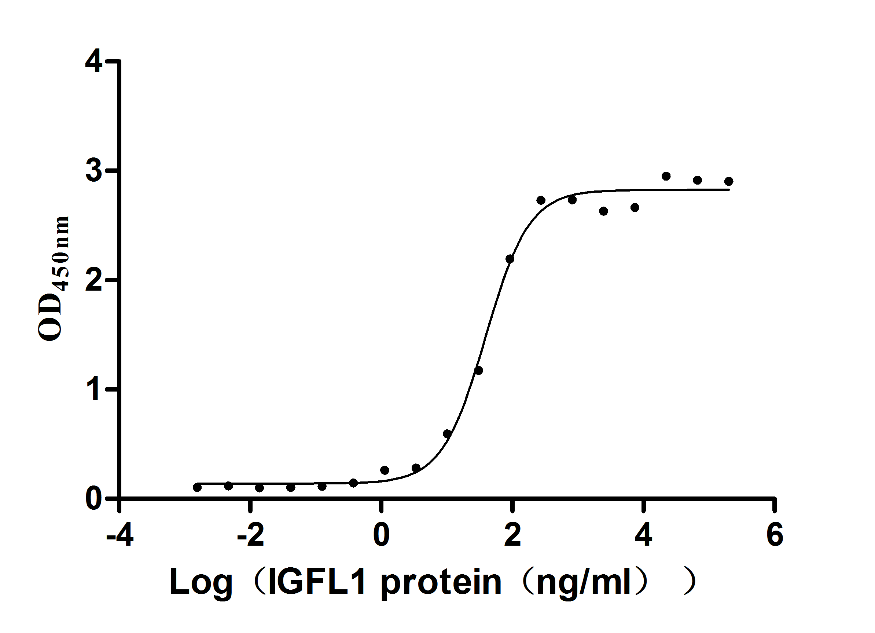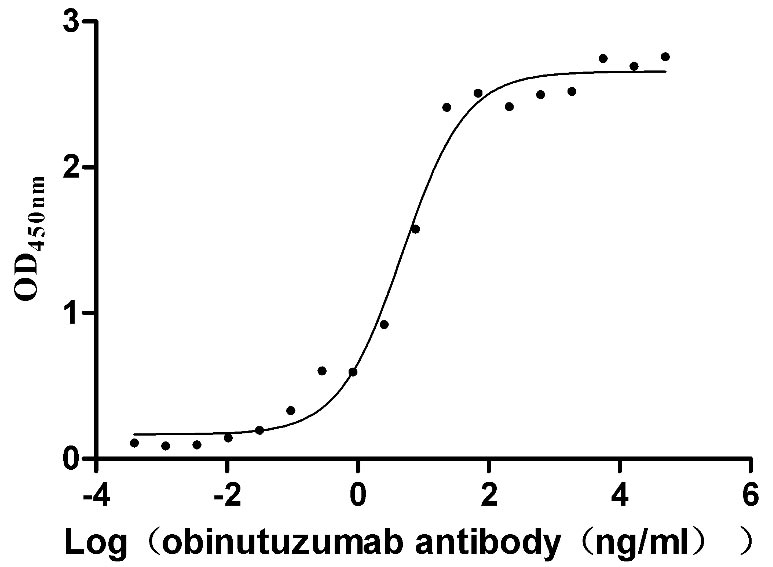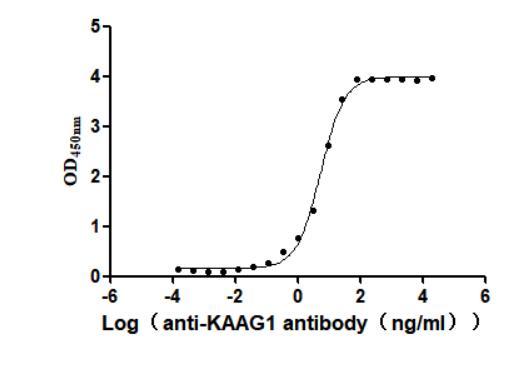Recombinant Human Inactive tyrosine-protein kinase 7 (PTK7), partial
-
中文名稱:人PTK7 CCK4重組蛋白
-
貨號(hào):CSB-EP622651HU
-
規(guī)格:
-
來源:E.coli
-
其他:
-
中文名稱:人PTK7 CCK4重組蛋白
-
貨號(hào):CSB-EP622651HU-B
-
規(guī)格:
-
來源:E.coli
-
共軛:Avi-tag Biotinylated
E. coli biotin ligase (BirA) is highly specific in covalently attaching biotin to the 15 amino acid AviTag peptide. This recombinant protein was biotinylated in vivo by AviTag-BirA technology, which method is BriA catalyzes amide linkage between the biotin and the specific lysine of the AviTag.
-
其他:
-
中文名稱:人PTK7 CCK4重組蛋白
-
貨號(hào):CSB-BP622651HU
-
規(guī)格:
-
來源:Baculovirus
-
其他:
-
中文名稱:人PTK7 CCK4重組蛋白
-
貨號(hào):CSB-MP622651HU
-
規(guī)格:
-
來源:Mammalian cell
-
其他:
產(chǎn)品詳情
-
純度:Greater than 85% as determined by SDS-PAGE.
-
基因名:PTK7 CCK4
-
Uniprot No.:
-
別名:8430404F20Rik; CCK 4; CCK-4; Colon carcinoma kinase 4; Human colon carcinoma kinase 4 (CCK4) mRNA complete cds; Inactive tyrosine-protein kinase 7; mPTK7/CCK4; OTTHUMP00000217016; Protein tyrosine kinase PTK 7; Protein-tyrosine kinase 7; Pseudo tyrosine kinase receptor 7; PTK 7; PTK7; PTK7 protein tyrosine kinase 7; PTK7 protein tyrosine kinase; PTK7_HUMAN; Serum response factor; Srf; Tyrosine-protein kinase-like 7
-
種屬:Homo sapiens (Human)
-
蛋白長(zhǎng)度:Partial
-
表達(dá)區(qū)域:31-704aa
-
氨基酸序列AIVFIKQPSSQDALQGRRALLRCEVEAPGPVHVYWLLDGAPVQDTERRFAQGSSLSFAAVDRLQDSGTFQCVARDDVTGEEARSANASFNIKWIEAGPVVLKHPASEAEIQPQTQVTLRCHIDGHPRPTYQWFRDGTPLSDGQSNHTVSSKERNLTLRPAGPEHSGLYSCCAHSAFGQACSSQNFTLSIADESFARVVLAPQDVVVARYEEAMFHCQFSAQPPPSLQWLFEDETPITNRSRPPHLRRATVFANGSLLLTQVRPRNAGIYRCIGQGQRGPPIILEATLHLAEIEDMPLFEPRVFTAGSEERVTCLPPKGLPEPSVWWEHAGVRLPTHGRVYQKGHELVLANIAESDAGVYTCHAANLAGQRRQDVNITVATVPSWLKKPQDSQLEEGKPGYLDCLTQATPKPTVVWYRNQMLISEDSRFEVFKNGTLRINSVEVYDGTWYRCMSSTPAGSIEAQARVQVLEKLKFTPPPQPQQCMEFDKEATVPCSATGREKPTIKWERADGSSLPEWVTDNAGTLHFARVTRDDAGNYTCIASNGPQGQIRAHVQLTVAVFITFKVEPERTTVYQGHTALLQCEAQGDPKPLIQWKGKDRILDPTKLGPRMHIFQNGSLVIHDVAPEDSGRYTCIAGNSCNIKHTEAPLYVVDKPVPEESEGPGSPPPYKMIQT
-
蛋白標(biāo)簽:Tag?type?will?be?determined?during?the?manufacturing?process.
The tag type will be determined during production process. If you have specified tag type, please tell us and we will develop the specified tag preferentially. -
產(chǎn)品提供形式:Lyophilized powder
Note: We will preferentially ship the format that we have in stock, however, if you have any special requirement for the format, please remark your requirement when placing the order, we will prepare according to your demand. -
復(fù)溶:We recommend that this vial be briefly centrifuged prior to opening to bring the contents to the bottom. Please reconstitute protein in deionized sterile water to a concentration of 0.1-1.0 mg/mL.We recommend to add 5-50% of glycerol (final concentration) and aliquot for long-term storage at -20℃/-80℃. Our default final concentration of glycerol is 50%. Customers could use it as reference.
-
儲(chǔ)存條件:Store at -20°C/-80°C upon receipt, aliquoting is necessary for mutiple use. Avoid repeated freeze-thaw cycles.
-
保質(zhì)期:The shelf life is related to many factors, storage state, buffer ingredients, storage temperature and the stability of the protein itself.
Generally, the shelf life of liquid form is 6 months at -20°C/-80°C. The shelf life of lyophilized form is 12 months at -20°C/-80°C. -
貨期:Delivery time may differ from different purchasing way or location, please kindly consult your local distributors for specific delivery time.Note: All of our proteins are default shipped with normal blue ice packs, if you request to ship with dry ice, please communicate with us in advance and extra fees will be charged.
-
注意事項(xiàng):Repeated freezing and thawing is not recommended. Store working aliquots at 4°C for up to one week.
-
Datasheet :Please contact us to get it.
相關(guān)產(chǎn)品
靶點(diǎn)詳情
-
功能:Inactive tyrosine kinase involved in Wnt signaling pathway. Component of both the non-canonical (also known as the Wnt/planar cell polarity signaling) and the canonical Wnt signaling pathway. Functions in cell adhesion, cell migration, cell polarity, proliferation, actin cytoskeleton reorganization and apoptosis. Has a role in embryogenesis, epithelial tissue organization and angiogenesis.
-
基因功能參考文獻(xiàn):
- miR2055p is involved in the proliferation, migration and invasion of colorectal cancer cells through inhibiting PTK7. PMID: 29488611
- Higher expression of PTK7 significantly indicates worse prognosis in human malignancies PMID: 28924970
- Inhibition of PTK7 by siRNA treatment significantly decreases the viability of atypical teratoid rhabdoid tumors (ATRT)patient-derived tumor cell lines.These studies provide the groundwork for future preclinical in vivo studies aiming to investigate the efficacy of PTK7 inhibition on ATRT tumor growth PMID: 28442586
- PTK7 localization and protein stability is affected by canonical Wnt ligands. PMID: 28420671
- These findings demonstrate that PTK7 upregulates MMP9 through activation of AP-1 and NF-kappaB and, thus increases invasive properties of ESCC cells. PMID: 27689325
- PTK7 overexpression is associated with esophageal squamous cell carcinoma. PMID: 28545451
- Our data indicate that PTK7 protein expression is associated with the prognosis of oral tongue squamous cell carcinoma PMID: 28547980
- PTK7 expression was correlated with tumor differentiation (P=0.027), lymph node metastasis (P=0.005), distant metastasis (P=0.001) and TNM stage (P=0.028) of colorectal cancer patients PMID: 27499181
- High PTK7 expression is associated with radioresistance in esophageal squamous cell carcinoma. PMID: 27557627
- PTK7 enriches in self-renewing, multipotent stem cells of the human colon. PMID: 26549850
- findings implicate PTK7 as a risk factor for NTDs and provide additional evidence for a pathogenic role of PCP signaling in these malformations PMID: 26368655
- overexpression in PTK7-negative cancer cells led to increased metastatic events. PTK7 expression thus represents a potential prognostic biomarker and a novel therapeutic target in CRC. PMID: 25962058
- data demonstrates that PTK7 regulates the activity of KDR biphasically by inducing oligomerization of KDR molecules at lower concentrations and by surrounding KDR molecules at higher concentrations. PMID: 25986862
- PTK7 regulates Id1 expression in CD44-high glioma cell lines. Targeting PTK7 could be an effective strategy for treating glioma with high CD44 expression. PMID: 25204555
- The results suggest that N-acylethanolamine acid amidase and protein tyrosine kinase 7 may be used as potential tissue biomarkers to avoid overtreatment of non-aggressive prostate cancer PMID: 24741114
- Expression level of PTK7 was significantly decreased from benign to malignant ovarian epithelial tumors. survival analysis showed that patients with negative expression of PTK7 protein had poorer outcome than those with positive expression. PMID: 25550828
- PTK7 acts as a cancer-related gene and may be a potent prognostic marker for Hepatocellular carcinoma(HCC). PMID: 25796105
- results provide convincing evidence that both PTK7 expression and proteolysis, rather than the level of the cellular full-length PTK7 alone, contribute to efficient directional cell motility and metastasis in cancer PMID: 25006253
- PTK7 expression plays an important role in the invasiveness of intrahepatic cholangiocarcinoma (ICC) cells and leads to a poor prognosis in ICC patients. PMID: 24587299
- PTK 7 is a transforming gene and prognostic marker for breast cancer and nodal metastasis involvement. PMID: 24409301
- This work defines PTK7 as a highly and specifically expressed gene in adenocarcinoma and a potential therapeutic target in this subset of NSCLC. PMID: 24654231
- Increased expression of PTK7 was inversely correlated with overall survival. PMID: 23663482
- in patients treated by chemotherapy, patients with PTK7-negative tumors seemed to have better DFS than those with PTK7-positive tumors, particularly for patients treated with only anthracycline-therapy drugs PMID: 24023307
- PTK7 is a novel marker of epithelial to mesenchymal transitions PMID: 23209741
- cleavage of the PTK7 ectodomain by an ADAM proteinase was coupled with the membrane type-1 matrix metalloproteinase (MT1-MMP) cleavage of the PKP(621) downward arrowLI site in the seventh Ig-like domain of PTK7. PMID: 23095747
- PTK7 has utility as a biomarker for detecting minimal residual disease of T cell acute lymphoblastic leukemia in the bone marrow PMID: 22898210
- a novel role for PTK7 in the tumorigenesis via generation of PTK7-CTF2 by sequential cleavage of ADAM17 and gamma-secretase. PMID: 22665490
- aberrations in the membrane type 1 matrix metalloproteinase/PTK7 axis are detrimental to cell movements that shape the body plan PMID: 21518755
- Observations may indicate a role for PTK7 in cell proliferation and cell apoptosis and may provide a potential therapeutic pathway for the treatment of a variety of cancers. PMID: 21103379
- Protein Tyrosine Kinase 7 is required for beta-catenin-dependent transcriptional events induced by canonical Wnt ligands PMID: 21132015
- Results indicate that PTK7 is a major target of MT1-MMP. PMID: 20837484
- PTK7 is a planar cell polarity component expressed in the myeloid progenitor compartment that conveys promigratory and antiapoptotic signals into the cell and represents an independent prognosis factor in patients treated with induction chemotherapy. PMID: 20558616
- cloning, sequencing and expression of gene and its splice variants PMID: 12427550
- Lack of a thermodynamically meaningful self-association propensity for the CCK4 transmembrane domains demonstrates that the conserved GxxxG motif is not sufficient to drive CCK4 transmembrane helix-helix interactions. PMID: 15683231
- mechanism of PTK7 upregulation in colorectal cancer PMID: 17671748
- PTK7 plays an important role not only in tube formation, migration, and invasion of endothelial cells but also in angiogenesis. PMID: 18471990
顯示更多
收起更多
-
亞細(xì)胞定位:Membrane; Single-pass type I membrane protein. Cell junction. Note=Colocalizes with MMP14 at cell junctions. Also localizes at the leading edge of migrating cells.
-
蛋白家族:Protein kinase superfamily, Tyr protein kinase family, Insulin receptor subfamily
-
組織特異性:Highly expressed in lung, liver, pancreas, kidney, placenta and melanocytes. Weakly expressed in thyroid gland, ovary, brain, heart and skeletal muscle. Also expressed in erythroleukemia cells. But not expressed in colon.
-
數(shù)據(jù)庫鏈接:
Most popular with customers
-
Recombinant Human IGF-like family receptor 1 (IGFLR1), partial (Active)
Express system: Mammalian cell
Species: Homo sapiens (Human)
-
Recombinant Human B-lymphocyte antigen CD20 (MS4A1)-VLPs (Active)
Express system: Mammalian cell
Species: Homo sapiens (Human)
-
Recombinant Macaca fascicularis zymogen granule protein 16 homolog B (ZG16B) (Active)
Express system: Mammalian cell
Species: Macaca fascicularis (Crab-eating macaque) (Cynomolgus monkey)
-
Recombinant Rat Gastric inhibitory polypeptide receptor (Gipr), partial (Active)
Express system: Mammalian cell
Species: Rattus norvegicus (Rat)
-
-
Recombinant Human Kidney-associated antigen 1(KAAG1) (Active)
Express system: Baculovirus
Species: Homo sapiens (Human)
-
Express system: Mammalian cell
Species: Homo sapiens (Human)



















